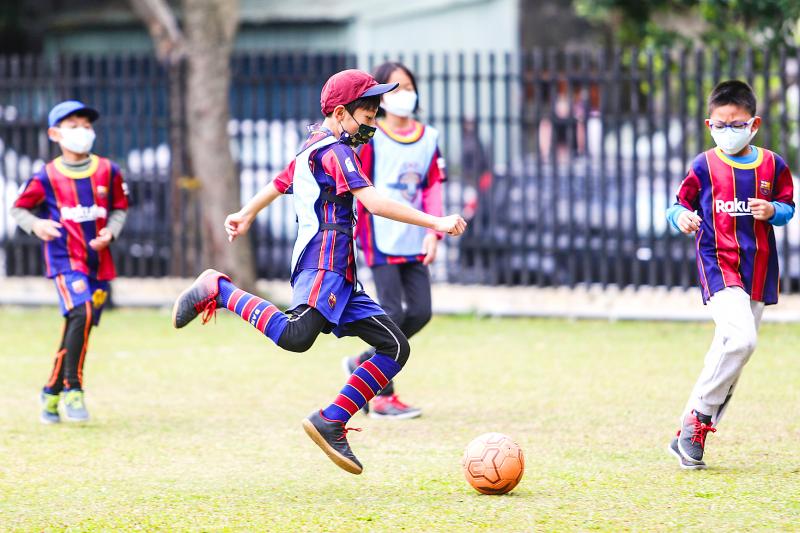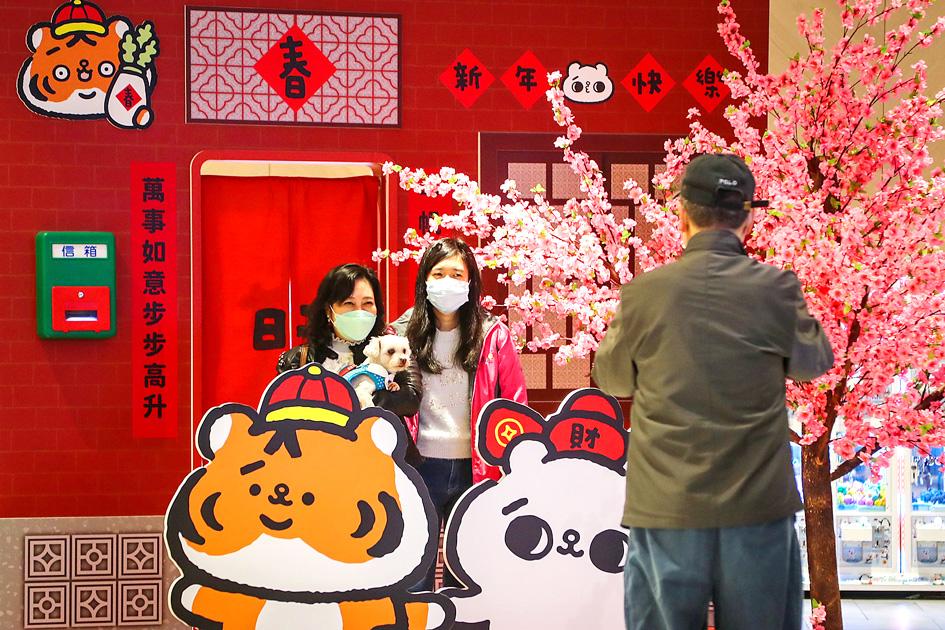A level 2 COVID-19 alert has been extended until Jan. 24, while a mask mandate and other measures have been tightened in response to an increase in local transmissions of the Omicron variant of SARS-CoV-2, the Central Epidemic Command Center (CECC) said yesterday.
Minister of Health and Welfare Chen Shih-chung (陳時中), who heads the center, said that the main rule to be revised under the level 2 alert is the mask mandate: The circumstances under which the mask mandate was previously eased are no longer exempted.
“The wearing of masks will once again be required when exercising, singing, taking photos, broadcasting live, recording video, hosting, reporting, giving a speech, lecturing, or participating in the filming of events with discussions or interviews,” he said.

Photo: CNA
A few exemptions would remain if social distancing could be maintained, such as people in agriculture, forestry, fishing and animal husbandry who work outdoors, as well as people visiting forests, beaches, springs, steam baths, spas or saunas, or taking part in water activities, Chen said.
However, such people would need to carry a mask and put it on if they are unable to practice social distancing with strangers, or if they have suspected COVID-19 symptoms, he said.
When they go out, people can take off their mask when eating or drinking, he added.

Photo: CNA
Businesses and public facilities, including public transportation, must strictly implement contact registration, body temperature checks and enhanced disinfection measures, while monitoring the health of employees and responding immediately to confirmed cases, Chen said, adding that the sampling of food in stores and the making of toasts at each table at banquets is prohibited.
Crowd flow must be controlled and crowd limits respected in businesses and public venues, with people to remain 1.5m apart indoors (2.25m2 per person) and 1m apart outdoors (1m2 per person), he said.
More infected travelers are expected to arrive in Taiwan, so the “line of defense” would be moved up, Chen said, adding that travelers on long-haul flights would need to test negative at airports before being transported to a quarantine hotel or facility.
At local airports, passenger routes and rest areas would be re-designed and the testing method would be decided in a couple of days, with the new policy hopefully being implemented as soon as possible, he said.
Asked about local Omicron cases in northern Taiwan, Chen said that visiting patients at hospitals in Taipei, New Taipei City, Keelung and Taoyuan is banned to protect patients and healthcare workers, and conserve medical capacity.
Where there are exceptions granted by local governments or individual hospitals, visitors must provide a negative rapid antigen test result or a negative polymerase chain reaction test result from within three days of the visit.
Fully vaccinated visitors are offered a government-funded test, while those who are not fully vaccinated must pay for the test.
Hospitalized patients can only be accompanied by one caregiver who, whether they are vaccinated or not, must undergo a government-funded test for COVID-19 before entering the hospital room, and cannot have suspected symptoms or have had contact with a confirmed case.
Healthcare workers taking care of COVID-19 patients who are eligible for a booster dose should receive it before Feb. 1 or be assigned to other hospital duties.
COVID-19 safety guidelines for long-term care facilities in Taipei, New Taipei City, Keelung and Taoyuan have been revised to reduce the risk of virus transmission in the facilities, Chen said.
Visitors to such facilities are also banned, unless given special approval by the facility, he said, adding that visitors must also provide a negative result from a self-paid COVID-19 test administered within three days of visiting.
New residents, whether vaccinated or not, must present a negative result from a self-paid COVID-19 test within three days of checking in.
At a facility that has more than 90 percent of the workers and 80 percent of the residents fully vaccinated, a new resident should avoid attending group activities for the first 14 days.

The US government has signed defense cooperation agreements with Japan and the Philippines to boost the deterrence capabilities of countries in the first island chain, a report by the National Security Bureau (NSB) showed. The main countries on the first island chain include the two nations and Taiwan. The bureau is to present the report at a meeting of the legislature’s Foreign Affairs and National Defense Committee tomorrow. The US military has deployed Typhon missile systems to Japan’s Yamaguchi Prefecture and Zambales province in the Philippines during their joint military exercises. It has also installed NMESIS anti-ship systems in Japan’s Okinawa

TRAGEDY STRIKES TAIPEI: The suspect died after falling off a building after he threw smoke grenades into Taipei Main Station and went on a killing spree in Zhongshan A 27-year-old suspect allegedly threw smoke grenades in Taipei Main Station and then proceeded to Zhongshan MRT Station in a random killing spree that resulted in the death of the suspect and two other civilians, and seven injured, including one in critical condition, as of press time last night. The suspect, identified as a man surnamed Chang Wen (張文), allegedly began the attack at Taipei Main Station, the Taipei Fire Department said, adding that it received a report at 5:24pm that smoke grenades had been thrown in the station. One man in his 50s was rushed to hospital after a cardiac arrest

‘WIN-WIN’: The Philippines, and central and eastern European countries are important potential drone cooperation partners, Minister of Foreign Affairs Lin Chia-lung said Minister of Foreign Affairs Lin Chia-lung (林佳龍) in an interview published yesterday confirmed that there are joint ventures between Taiwan and Poland in the drone industry. Lin made the remark in an exclusive interview with the Chinese-language Liberty Times (the Taipei Times’ sister paper). The government-backed Taiwan Excellence Drone International Business Opportunities Alliance and the Polish Chamber of Unmanned Systems on Wednesday last week signed a memorandum of understanding in Poland to develop a “non-China” supply chain for drones and work together on key technologies. Asked if Taiwan prioritized Poland among central and eastern European countries in drone collaboration, Lin

ON ALERT: Taiwan’s partners would issue warnings if China attempted to use Interpol to target Taiwanese, and the global body has mechanisms to prevent it, an official said China has stationed two to four people specializing in Taiwan affairs at its embassies in several democratic countries to monitor and harass Taiwanese, actions that the host nations would not tolerate, National Security Bureau (NSB) Director-General Tsai Ming-yen (蔡明彥) said yesterday. Tsai made the comments at a meeting of the legislature’s Foreign Affairs and National Defense Committee, which asked him and Minister of National Defense Wellington Koo (顧立雄) to report on potential conflicts in the Taiwan Strait and military preparedness. Democratic Progressive Party (DPP) Legislator Michelle Lin (林楚茵) expressed concern that Beijing has posted personnel from China’s Taiwan Affairs Office to its